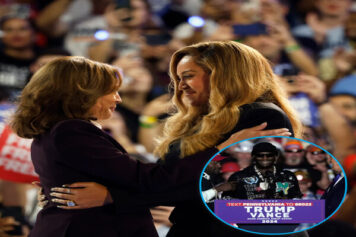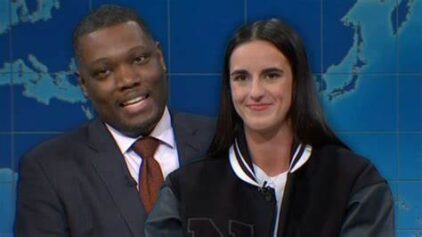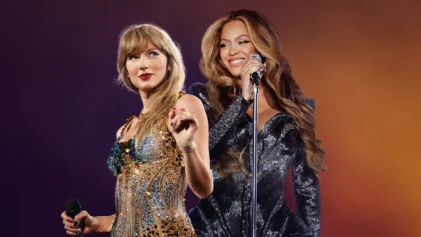Kenan Thompson, one of the rare black comedians to grace the Saturday Night Live (SNL) set, says his days of dressing in drag on the show are over. However, that doesn’t mean black women will be playing their own roles on SNL in the future. According to Thompson, sisters can’t bring the comic heat. “It’s just a tough part of the business,” he said, in an interview with TVGuide.com. “Like in auditions, they just never find ones that are ready.”
For its recently launched 39th season, SNL brought in six new featured players – five white men and one white woman. The best reaction to this came from tvline.com, saying, “The underwhelming Tim Robinson was allowed to stick around for Season 38, so it’s not like Lorne Michaels & Co. couldn’t afford to take a gamble and test out an up-and-coming black female (or two) in the interests of broadening their comedic horizons.”
There have only been four black women to get weekly SNL shine in the show’s 38-year existence. Not one has been seen since Maya Rudolph’s departure in 2007.
Danitra Vance was the first African American woman to become an SNL regular in its eleventh season (1985). She’s not to be confused with Yvonne Hudson from season six, who first appeared as a recurring extra for season four (1978-1979), season five (1979-1980), and was eventually hired full-time in 1981. Vance was the only SNL cast member to have a learning disability. A dyslexic, Vance, according to Al Franken's book, Live from New York: The Uncensored History of Saturday Night Live, was the first and only lesbian cast member hired. She is best remembered for the sketch "That Black Girl," (a spoof of the 1960s sitcom That Girl). And for her character Cabrini Green Harlem Watts Jackson, a teenage mother who kicked knowledge to the hood on the do's and don'ts of being pregnant.
Ellen Cleghorne, SNL's third black female cast member from 1991—1995, was the first to stay with the show for more than one season.
Despite a few spots of diversity, SNL has been a rough place for sisters. Once they get there, it’s even tougher to stick around. Before her passing in 1994, Vance reflected on her one-year stint on SNL with frustration over being forced to play the same stereotypical roles — waitresses, nurses, secretaries, unwed, welfare-dependent mothers, slaves and Aunt Jemima-style maids. She left the show at the end of 1986.
Recently, SNL announced that Kerry Washington will make her debut as host on Nov. 2, a move greeted with praise from Scandal fans. But the news has popped off a firestorm of opinions and a closer look at the exclusive hiring practices of the iconic show.
Thompson did his best “Uncle Tom” impersonation by defending the obviously discrimatory actions by SNL, probably because their hiring practices aren’t much different from any job in America. African-Americans are typically rarely seen in large numbers among elite careers, film roles and positions of power. And equally qualified African-American women in particular, have always been snubbed on jobs in favor of their male counterparts.
Racism, coupled with sexism, is part of the American way. Voting rights is one glaring historic example. Though certain states granted women voting rights, it wasn’t until the 19th Amendment was passed in 1920 that all women who were U.S. citizens were awarded the right to participate in national elections. Today, look no further than the billion-dollar business of college athletics for more echoes of inequality. In Dr. Richard Lapchick’s annual college sport race and gender report card, released in 2011 by The Institute for Diversity and Ethics in Sport (TIDES), he discovered that White men hold 90 of the 120 president positions (75 percent) and 101 of the 120 athletic director positions (84.2 percent) at FBS schools. And the corporate world is no different than an episode of Mad Men. Women are striking gold in the ranks of America’s biggest companies, but they’re still having trouble getting the platinum jobs. According to Bloomberg, women only make up 4 percent of CEOs at large companies — a figure that’s barely moved in the past five years. On top of that, 10 percent of S&P 500 companies don’t even have women on their boards, according to data from non-profit Catalyst.
Saturday Night Live's testosterone, caucasion-heavy lineup is a reflection of the times, but don't think Thompson's blind views mirror the opinions of others on the show. Fellow African-American cast member, Jay Pharoah, didn’t throw smoke screens when criticizing the show's continuous failure in hiring a female black cast member. “They need to pay attention,” he said in an interview with The Grio, before boldly throwing comedian Darmirra Brunson’s name into the mix. “Why do I think she should be on the show? Because she’s black, first of all, and she’s really talented. She’s amazing. She needs to be on SNL. I said it. And I believe they need to follow up with it like they said they were going to do last year.”
But too often, odds beaters like Pharoah's co-worker, Thompson, who has been fortunate enough to build an impressive career hurdling racial prejudice in comedy, don’t do anything to put the onus on the employers. Perhaps they fear retribution or being “blackballed.”
“It’s one of those things that’s hard,” Pharoah continued, in a mild attempt to defend Thompson. “Some people choke up. Some people burn their bridges by saying things they shouldn’t say either. You just have to be very political about your delivery, what you say, and your performance. You’ve got to be on point. Everybody has to like you and want you to win. If they don’t like you, it’s a wrap.”
But Thompson, in explaining the lack of dope African American women comedians by saying, "They just never find ones that are ready,” sounds like a 70s cat in black face, double-spying for “The Man.” SNL employs only three actors of color out of 16 cast members (Thompson, Pharaoh and the Iranian Nasim Pedrad). So Keenan's words can be likened to a NFL owner rationalizing the absurdly low numbers of African American NFL coaches. It’s that type of inaccurate portrayal that can discourage young sisters listening and watching from becoming comedians. Wanting us to believe that the reason why we don’t see impersonations of Michelle Obama, Oprah Winfrey and Beyonce on NBC’s longest-running sketch comedy series is because black women aren’t qualified. It's such an oldschool and biased viewpoint that Thompson’s comments have only added gasoline to the flame.
Twitter was raging shortly after his words were posted. Media pundits, “black” publications, and even black comedian/actress Aisha Tyler, co-host of The Talk and the new host of Whose Line is it Anyway?, jumped on Thompson keeping her tweet brief, saying, “yeah he’s dumb.”
Either Thompson really believes his crap, or he is suffering from another well-known black problem: African Americans who become territorial and selfish when they ascend to positions primarily awarded to white people.
The thought brings up comedic memories of 2001's Not Another Teen Movie, where a black actor played by Deon Richmond (Rudy Huxtable’s friend “Bud” on the Cosby Show) is the only African American at an all white college party. When he sees another black guy pouring himself a beer, Richmond's character runs up to him and says, “What are you doing here?” The guy replies, “What do you mean?” Richmond responds, “Well. I’m supposed to be the only black guy at this party.” The dude looks at him with total understanding, hands Richmond his beer and says, “my bad…peace out brother,” and exits the party. Richmond responds, “It’s ok. Honest mistake.”
Funny, but once the drunken effects are laughed off; it becomes a sobering and sad reflection of how African Americans have a tendency to interact. Many ignore the fact that other qualified blacks are being overlooked and shut out of the same opportunities that they now have the power to elevate fellow brothers and sisters to.
Hopefully Thompson gives further clarification as to what he was getting at. It’s just surprising that he would go down this old dusty, dirt road littered with stories of discrimination, hate and ignorance. When prominent blacks like him respond to obvious discrimination with such conformity and acceptance, it makes it easy for the people that hold hiring clout to deprive great comedians a chance to share their talents. Yes, SNL has the right to hire anybody it wants. They just need to wake up and keep it real with themselves and the rest of us, telling the truth about why they won’t hire black comedians so the problem can be rectified. Does Lorne Michaels even know he has a problem?
Because in 2013 nobody is buying the excuse that “blacks can’t” anymore. And unless people put pressure on these companies to hire fairly, and give a true representation of America’s deep ethnic diversity, the cats calling the shots won’t be moved to steer away from the same old program. And they'll use the same, age old excuses to justify disproportionate hiring practices of blacks, particularly in the mega-money, high-profile fields of sports and entertainment.
Some execs will argue that “America” doesn’t buy black. But when it comes to comedy, Richard Pryor, Eddie Murphy and most recently Tracy Morgan have proved this theory to be hogwash.
In 1980, when Murphy first blew up, he had a deal with Paramount and his own TV production company, Eddie Murphy TV Enterprises Ltd. The black comic industry was excited about the possibilities of having a rare African American voice with creative autonomy.
During a 1987 press conference for the classic movie Beverly Hills Cop II, a 26-year-old Murphy announced the existence of the "black pack," a clique of successful black comedians made up of Murphy, Robert Townsend, Arsenio Hall, Paul Mooney and Keenen Ivory Wayans. All of these guys supported each other’s projects and were making waves.
Despite the fact that Murphy also appointed his life-long buddies, Mark Corry and Clint Smith, VPs of his company, some still accused him of not doing enough to help bring other blacks into similar positions of power. Murphy then caught flack when he hired Mark McClafferty, an influential white television executive, to be company President.
According to a 1988 LA Times article, one black producer argued: "Murphy has the power to change this industry, but to do so he must develop institutions and utilize qualified and professional black talent. It's great that he's opened doors for his friends, but he hasn't really put them in the power positions. He's got to do more than just hire (white) people who can get their calls taken by the powers that be."
Being a black in a position of power can be a double-edged sword. When you don’t do anything, you get blasted and when you do, people say you should of done more. Still, racial inequality should never be accepted. And if powerful and privileged people like Thompson continue to bend over for “the system” and diss other brothers and sisters in the process, then the problem will continue.
But maybe he really does think black women just aren’t funny. Maybe he wants to keep the door open to performing in cross-dressing skits. Either way, in understanding his God-given opportunity to be one of the “lucky” or “chosen” ones, Thompson missed a rare opportunity to move beyond his non-threatening demeanor as an overweight, black comedian, who nobody really takes seriously. He could have shed some light on a foul situation that most people accept and ignore. He could have explained how black America needs heroes, comedians and people in all walks of life for young folks to identify with. It’s the moment of truth that my dad always told me about: When an African American has the chance to improve the life and opportunity of his brethren, he must grasp it and once he does, he will gain the support of other blacks who have been waiting for a hero to bring attention to continued race discrimination, which turns into frustration and financial hardships.
We have proven under insurmountable odds that we are a race overflowing with intelligence, resilience and talent. Eventually, someone will step up and force SNL to address three decades of discrimination and suppression of black genius. Even if Kenan Thompson wants to keep his hamburger to himself.



